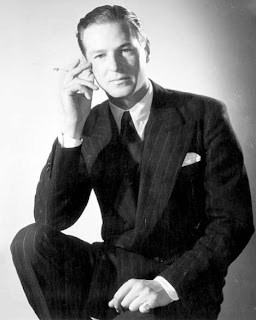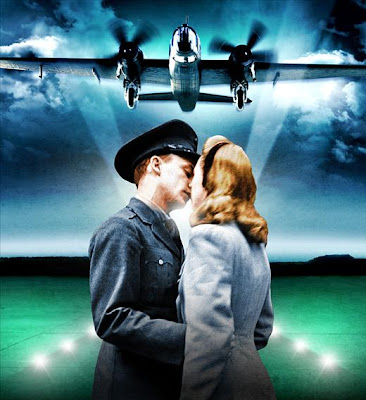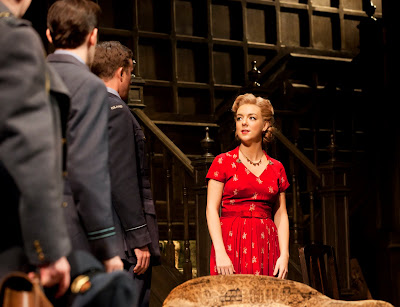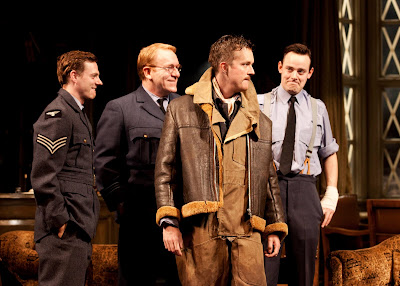 I suspect we shall know by the end of the year where we stand with Terence Rattigan. Much is being made that this year marks the centenary of his birth and a slew of productions are being staged to celebrate this as well as the release later in the year of Terence Davies' remake of THE DEEP BLUE SEA.
I suspect we shall know by the end of the year where we stand with Terence Rattigan. Much is being made that this year marks the centenary of his birth and a slew of productions are being staged to celebrate this as well as the release later in the year of Terence Davies' remake of THE DEEP BLUE SEA.It's all rather odd as 2011 is also the centenary of Tennessee Williams' birth and he is a writer whose work has received more attention in the past few years in London than Rattigan's but of Tennessee there appears to be nary a peep of celebrations this year.
Rattigan in truth has never been that far from our stages with fairly frequent revivals of THE DEEP BLUE SEA and, to a lesser extent, SEPARATE TABLES and THE WINSLOW BOY but I suspect the upswing in Rattigan's profile has been due to the phenomenal success last year of the National Theatre's AFTER THE DANCE. This seems to have led to him now being seen more as a playwright to be taken seriously as opposed to a writer whose plays make handy vehicles for starry revivals.
 Trevor Nunn is launching his tenure as Artistic Director of the Theatre Royal Haymarket with a production of Rattigan's 1941 play FLARE PATH, written while he was serving with the RAF. It is what you expect from Rattigan, a solid well-made West End play with a beginning, a middle and an end - in that order. Not as haunting as AFTER THE DANCE but worthy of a revival I guess.
Trevor Nunn is launching his tenure as Artistic Director of the Theatre Royal Haymarket with a production of Rattigan's 1941 play FLARE PATH, written while he was serving with the RAF. It is what you expect from Rattigan, a solid well-made West End play with a beginning, a middle and an end - in that order. Not as haunting as AFTER THE DANCE but worthy of a revival I guess.The Falcon Hotel is a genteel Lincolnshire hotel which has as it's clientele the officers (and wives) of the neighbouring RAF airbase. We follow the events that take place over a single night when the airmen are recalled to the base for a night flight over Germany. One of the four planes in the squadron is fired upon by waiting enemy planes on take-off and one is reported Missing In Action and we watch as the news of a missing pilot refracts on his wife and his friends.
 Rattigan rewrote the play for the 1945 film THE WAY TO THE STARS which packs a more emotional punch as he didn't hedge his dramatic bets as he does here. I suspect that because the film script was written towards the end of the war, it was easier to include lead characters being killed in action.
Rattigan rewrote the play for the 1945 film THE WAY TO THE STARS which packs a more emotional punch as he didn't hedge his dramatic bets as he does here. I suspect that because the film script was written towards the end of the war, it was easier to include lead characters being killed in action.The action here is given a melodramatic twist by having the hotel's occupants surprised by the appearance in their midst of Peter Kyle, an actor who has made a name for himself in Hollywood. It turns out that it isn't just a random visit as Kyle has been conducting a clandestine affair with Patricia, one of the pilot's wives. She is on the verge of telling her husband that she is leaving him when the call comes through for the night flight so the tension is stretched to breaking point between the lovers.
 With not much sub-text to play, Trever Nunn ramps up the tension of the waiting women and this works very well. He also elicits sympathetic performances from his cast, the stand-out being the 'West End's Sweetheart' Sheridan Smith as Doris the down-to-earth and amiable ex-barmaid who now finds herself the Countess Skriczevinsky after her marriage to a Polish airman.
With not much sub-text to play, Trever Nunn ramps up the tension of the waiting women and this works very well. He also elicits sympathetic performances from his cast, the stand-out being the 'West End's Sweetheart' Sheridan Smith as Doris the down-to-earth and amiable ex-barmaid who now finds herself the Countess Skriczevinsky after her marriage to a Polish airman.Sheridan was the real heart of the play and as the realisation dawned that her husband had not returned with the others, she shone with a stoic sadness. In the scene where Doris asked Kyle to read her the letter that her husband left to be opened in the event of his death, her delicate reactions were heart-breaking.
 Owing to the non-appearing James Purefoy, the lead role of Peter Kyle was played by Jim
Owing to the non-appearing James Purefoy, the lead role of Peter Kyle was played by Jim  Creighton and he was very good. Kyle secretly knows he is coming to the end of his Leading Man roles and is banking all on his relationship with Patricia and Creighton played this quiet desperation very well.
Creighton and he was very good. Kyle secretly knows he is coming to the end of his Leading Man roles and is banking all on his relationship with Patricia and Creighton played this quiet desperation very well.The role of Patricia was played by media darling Sienna Miller. She was ok as the stage actress torn between her love for Kyle and her duty to her obviously disturbed pilot husband but watching her I was amazed that her name has such cachet. There are any number of actresses who could play the role as well if not better and her blandly attractive, blonde looks conjure up the model on a Timotei ad rather than a memorable actress. The media's constant infatuation with her is truly baffling.
The role of the golden boy pilot Teddy Graham who is becoming more and more frazzled with each sortie was played well by the impossibly posh-named Harry Hadden-Paton and there was fine support from Joe Armstrong as Sgt. 'Dusty' Miller, Emma Handy as his visiting wife Maudie, Mark Dexter as Johnny the Polish flyer and in particular from Clive Wood as Squadron Leader Swanson aka 'Gloria' who made a sympathetic older 'uncle' to the pilots.
 It was an additional pleasure to see the play in a full theatre - although it was amusing to find that his personification of his core audience 'Aunt Edna' - "a nice, respectable, middle-class, middle-aged, maiden lady, with time on her hands and money to help her pass it, who resides in a West Kensington hotel" - is alive and well. She is going to need that money to catch up with all the upcoming productions of his work!
It was an additional pleasure to see the play in a full theatre - although it was amusing to find that his personification of his core audience 'Aunt Edna' - "a nice, respectable, middle-class, middle-aged, maiden lady, with time on her hands and money to help her pass it, who resides in a West Kensington hotel" - is alive and well. She is going to need that money to catch up with all the upcoming productions of his work!
No comments:
Post a Comment